내외 전문가들,《동포연합》창립20돌 기념강연
페이지 정보
작성자 편집실 작성일17-02-08 04:21 조회8,188회 댓글3건관련링크
본문
《재미동포전국연합회(윤길상 회장)》창립기념 20주년기념 강연회는 내외 전문가들이 함께 모여 한반도(조선반도) 문제들을 조명해 보면서 이에 대한 돌파구들을 찾아내는데 초점을 모았다. 코리아반도 전문가 부르스 커밍스 교수, 그레고리 에리히 연구원, 박문재 박사, 램지 림 교수 등이 이 발표회에 참가했다.[민족통신 편집실]
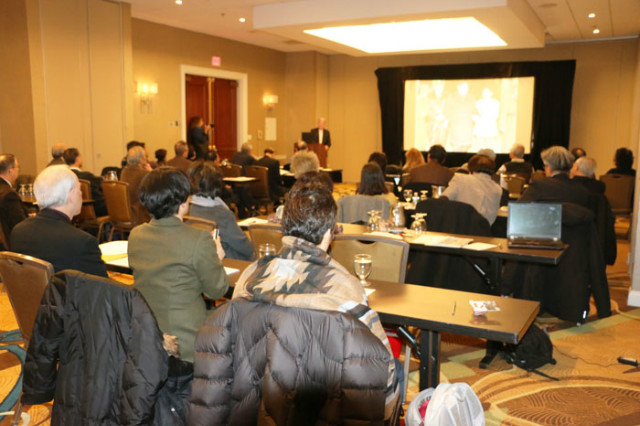
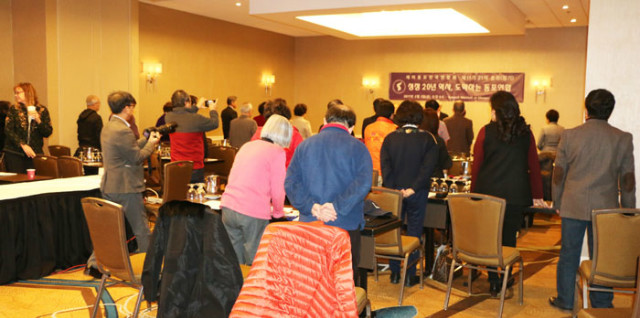
내외 전문가들,《동포연합》창립20돌 기념강연
[뉴욕=민족통신노길남 편집인] 《재미동포전국연합회(윤길상 회장)》창립기념 20주년기념 강연회는내외 전문가들이 함께 모여 한반도(조선반도) 문제들을조명해 보면서이에 대한 돌파구들을 찾아내는데 초점을모았다.
재미동포전국연합회 회원들과미 전역에서 참석한손님들, 미국인 손님들이함께 참석한이날 강연회는 2월4일 뉴저지주티넼 메리오트 호텔 1층 강당에서 오전9 시부터 - 오후 5 시까지무려 8시간 동안 진행되었다. 이 행사에서 4명(부르스커밍스 교수, 그레고리엘리히 연구원, 박문재박사, 램지 림 교수)의 코리아반도 전문가들은 주제발표를 통해 그리고 논찬시간을 통해 아시아 속의 코리아분단과 긴장 등이 조성된 이유들과 이것을극복하기 위한 방도 등이 거론되었다. 이날 논찬자들은 박문재박사(재미동포전국연합회 수석부회장), 평화운동가 브라이언 베이커선생과 이정현 선생, 백승배 목사 등이 패널리스트로 출연하여 논평하였다. 그리고 발표자들과 관중들과사이에 질의응답 및 토론시간으로 진행된 진지한모임이 마련되어 참석하는동포들에게 여러가지 유익한정보들을 제공해주었다. 또한 렘지 림( Ramsay Liem) 교수가기획하고제작한 기록영화 'Memories of Forgotten War' (36분)를 관람하는순서와 이를 감상한소감들을 나누는시간도 있었다.
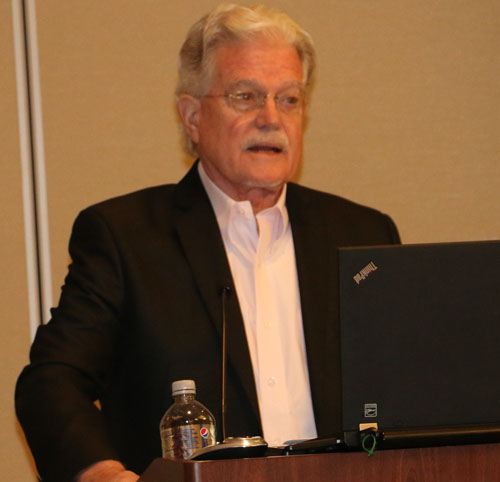
-부르스 커밍스(Bluce Cummings) 시카고대학교수(코리아 전쟁의기원-The Origin of The Korean War 저자)는 주로 조선의 건국역사와 이의 주역을 맡아 활동한 김일성주석의 발자취, 그리고 조선과 70여년 대결해온 조미대결의 역사를 비교적 객관적인 관점에서 요점적으로 정리하여 주면서 미국 언론들과 한미 양국 당국자들의 조선에 대한 왜곡 정보 등과 이들의 대조선고립압살 정책의 부당성, 그리고 대북정책의 실패들을 지적해 주었다.
그는 또 미국과 그 추종나라들의 대조선 제재정책들이 끊임없이 이어져왔으나 그것의 결과들은 긍정적인 점과 부정적인점들이 혼재되어 있었다고 평가했다. 미국은 역사적으로 북방한계선(NLL)을 공식으로 설정한 적이 없는데 한국 당국자들은 아직까지 이것을 이용하여 북측을 공격하여 왔다고 설명했다. 그는 헨리 키신저도 NLL 이 조미간 국제협의에 없는 선이라고 말했다.
클린턴 미대통령의 1994년 6월 북미간 협의, 죠지 더불유 부쉬 미대통령의 악의 축 발언과 이라크 침공사태, 오바마 미대통령의 대조선정책에서 전략적 인내로 일관해 온 일련의 대조선정책들은 성공한 정책들이 되지 못하였다고 고백하기도 했다.
이러한 결과로 조선은 미국을 위협하는 존재로 부상했다고 밝히면서 조선이 소유하게 된 첨단과학무기체계는 미국이 무시할수 없는 지경에 이르렀다고 인정했다. 미국 당국자들이나 언론들은 조선을 폄훼하고 악의 축이나 악마 등과 같은 존재로 부각시키는 것은 더 이상 통하지 않게 되었다고 말했다.
이에 대해 박문재 박사는 논찬자로나와 부르스 커밍스교수의 발표가 비교적 객관적이며 양심적인 학자의 소리라고 지적하고, “미국인들 대부분은 조선을 몰라도 너무 모른다”고 논평하면서 미국의 CNN, FOX 같은 언론들이 보도하는 것을 보면 조선을 악마화하기 위한 왜곡보도로 일관해 왔다고비판하는 한편 “그래서 재미동포전국연합회가 북부조국 바로알기운동을 더 열심히 벌여 나가야 한다.”고 강조했다.

-그레고리 에리히(Gregory Elich:한반도정책연구소-KPI 연구원)는 ‘변화할때가 된 조미관계(U.S.-North Korean Relations In a Time of Change)를 설명하면서 미국이나그 추종국들이 일본이나한국 당국자들과 언론들은“조선이 오래되지 않아 붕괴될 터이니 외교관계를 하지 않는게좋다.”는 식으로여론을 조성하면서 이란, 조선 등이 악마들이라고 선전해왔다고 지적했다.
(참고: http://minjok.com/bbs/board.php?bo_table=eng_korea&wr_id=2646 )
그는 미당국의모순을 들어 설명했다. 이스라엘이 핵을 보유하고개발해 왔는데도 미국은아무말 하지 않고 오히려 지원해왔는데 앞으로 10년 동안 380억 달러를 지원한다는 계획이다. 그리고 미국이 핵보유국인 파키스탄에게는2016년에 7억4천2백만 달러를지원했고, 미국은 또다른핵보유국인 인도에게는 7천5백만 달러가량 지원했다.
그런데 유독 조선의경우에만 도발이니 뭐니 하면서 비난하고 왜곡해온 것은 이중잣대였다고 꼬집으면서 이것은불평등 문제와 직결된다고 지적하는 한편 미국은 1천여차례나 핵실험을 하면서도조선이 불과 5차례 가량 핵시험한 것을 요란하게여론화하면서 제재와 함께 대조선적대시 정책을지속하는 것은 공평한자세가 아니다라고 진단했다.
이에 대한 발표에 대해 미 당국은지난 시기에도 대외정책의 문제점들이 많았지만 도널드 트럼프 미행정부도 대외정책을 어두운쪽으로 몰고 가고 있는 양상을 보이고있다고 분석했다. 그리고 인종차별주의 정책으로 가고 있는 것도 걱정스럽고, 큐바를 비롯하여 대외 고립정책을 펼치고 있는 것도 우려된다고 평가했다. 이로써 오전 발표들이 끝났다. 이 자리에서 점심식사를 나누며 참석자들간에 친교시간이 이뤄졌다.
강연회 자리에서 점심을 나눈 뒤에 오후 발표회가 이어졌다.
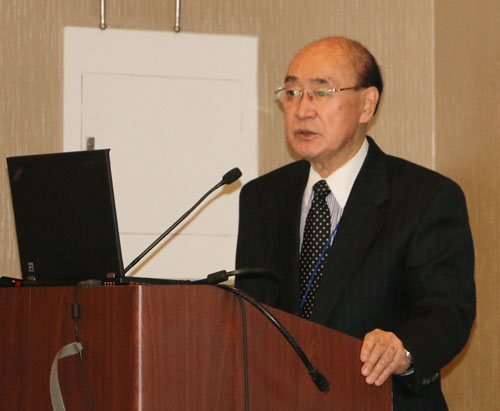
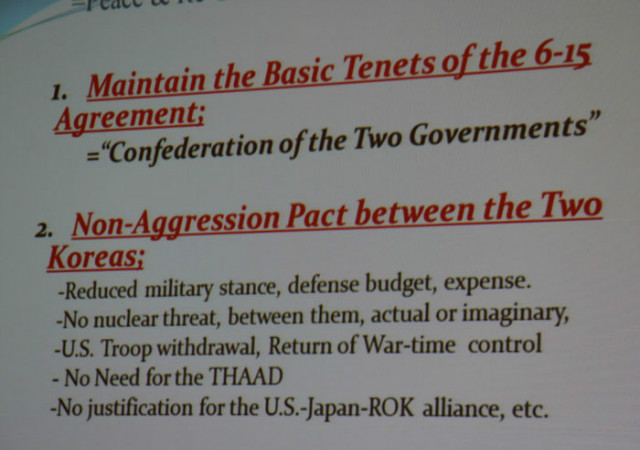
-박문재 박사가 코리아반도 문제를 해결하는방도로서 12가지 항목을 소개하여 참석자들의 흥미를 불러 일으켰다. 그는 기본적으로 《우리민족끼리 정신》에 기초하여이루자는 구상들이 그의 제안들 속에 담겨 있어 지대한 관심들을모았다.
박문재 박사는 이날 발표회를 통해 다음과 같은 12가지 사항들을 대안 방도들로 제기해 참석자들에게 지대한 관심을 모았다. 그 내용들의 요점을 소개하면 다음과 같다.
(1)6.15남북공동선언을 고수이행하여 연합방정부수립 구상 방안을비롯하여 (2) 남북간 불가침합의를 통하여 국방비 감축, 핵위협 금지, 외국군철수, 싸드 불필요, 한-미-일 3각동맹대신 남북주체역량 강화하자는 구상방안, (3)북 당국이 지금 소지하고있는 핵무기가 남한을공격하기 위한 것이 아니라는 것을 증빙해주는 구상방안, (4)남북연합방하는 즉시 핵무기공동소유한다는 구상방안, (5)공동경제개발 구상방안(울산,철원, 인천 그리고개성, 원산,남포 등), (6)남북한 상호무료지원을 위한 구상방안(지하자원, 식량 등), (7)남북 노농 민족군합쳐 120만 구상방안, (8)육,해,공군 및 로케트 군 공동개발구상방안, (9)남북 최고지도자들 정규상봉 구상방안, (10)영세중립국 선언 구상방안, (11)남북 생산개발 공동센터운영을 위한 구상방안, (12)교육, 의회, 첨단과학공동개발을 위한 구상방안이다. 박문재 박사는 이날 파워포인트로 위의 12가지 구상방안을 제안했다. 이에 대해 참석자들은 뜨거운분위기 속에 토론시간을 가졌다.(이에 대해서는 차후에 별도로보도할 계획임)
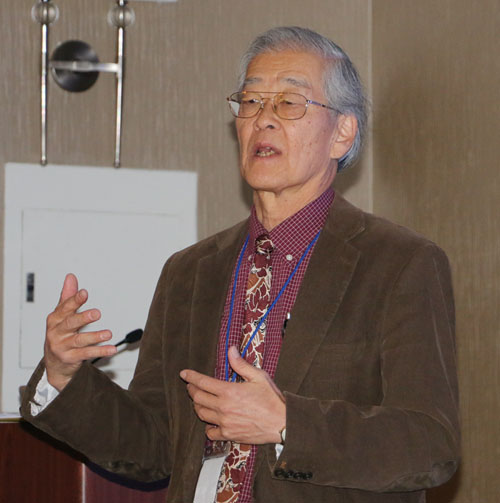
-램지 림(Ramsay Liem)교수 제작한이산가족들의 한을 다룬 영화 ‘잊혀진 코리아전쟁의 그날들(Memory of Forgotten War)’을 감상하고 백승배 목사의 이산가족이야기, 브라이언 베커 선생과 이현정 선생의 소감과 참석 관중들의 의견들을 개진하는 시간이 이어졌다.
이날 발표자들과 관중들은 모두 8시간의발표회는 아주 훌륭했다고 공감하면서 서로 유익했다고 축하인사들을 나누기도했다.
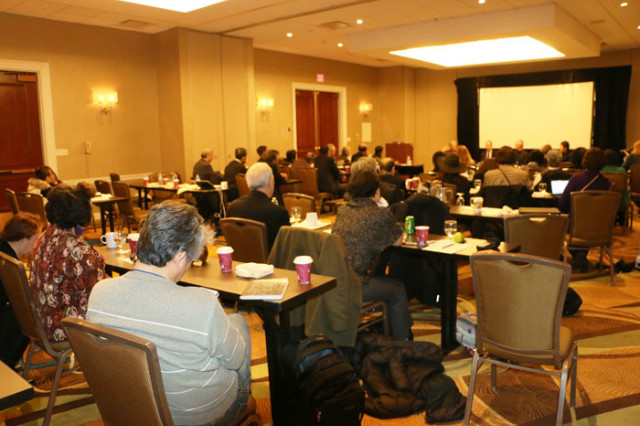
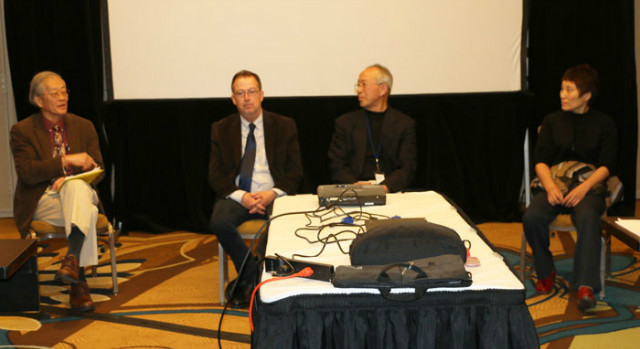
|
U.S.-NORTH KOREAN RELATIONS IN A TIME OF CHANGE
By Gregory Elich (The Board of Directors of the Jasenovac Research Institute and the Advisory Board of the Korea Policy Institute.) 
As we look ahead, many of us are wondering what to expect under a Trump presidency regarding relations with North Korea. After eight years of ‘strategic patience’ and the Rebalance to Asia, those relations now stand at their lowest point in decades. Many foreign policy elites are expressing frustration over Washington’s failure to impose its will on the Democratic People’s Republic of Korea, or DPRK. There are increasing calls for a change in policy, but what kind of change do they have in mind? We may be at the point of a major transition.
President Trump has given mixed signals on North Korea, ranging from saying he is open to dialogue, to insisting that North Korea cannot be allowed to possess nuclear weapons and that he could solve the dispute with a single call to China. It is fair to say that any change in policy direction is possible, although deeply entrenched interests can be counted on to resist any positive movement.
Other than his frequently expressed hard line on China, Trump has not otherwise demonstrated much interest in Asian-Pacific affairs. That may mean an increased likelihood that he will defer to his advisors, and conventional wisdom may prevail. The more influence Trump’s advisors have on North Korea policy, the more dangerous the prospects.
Michael Flynn, Trump’s choice for National Security Advisor, could be a key figure. Back in November, he told a South Korean delegation that the North Korean nuclear issue would be a top priority for the Trump administration. 1 At around the same time, he told a Japanese newspaper that the North Korean government should not be allowed to last very long, and he has no intention of negotiating an agreement. 2
Flynn has written that North Korea, Russia, China, Cuba and Venezuela are in a global alliance with radical Islam, a loopy concept if ever there was one. 3 It is a disturbing thought that a man so disconnected from reality is helping to shape policy.
Mike Pompeo, Trump’s selection for CIA director, believes that Iran and North Korea cooperate in what he calls “an evil partnership.” 4 He has also called for the mobilization of economic and military powers against the DPRK. 5
Establishment think tanks have been busily churning out policy papers, filled with recommendations for the new administration. That advice is likely to fall on receptive ears among Trump’s advisors. How much influence they will have on Trump’s decision-making is another question, but he is hearing a single message from those around him and from the Washington establishment.
A common theme running through these think tank policy papers is the demand to punish China for its relations with the DPRK.
The most moderate set of proposals offered the Trump administration is the one produced by Joel Wit for the U.S.-Korea Institute, in that it at least calls for an initial stage that Wit terms “phased coercive diplomacy.” Initial diplomatic contacts would “explore whether agreements that serve U.S. interests are possible while at the same time” the U.S. would lay the groundwork for “increasing pressure” on North Korea. A modest scaling back of the annual U.S. war games could be offered as an incentive to North Korea, along with negotiations on a peace treaty, as long as the U.S. feels it can gain more from North Korean concessions.
At the same time, Wit calls for the new administration to “communicate toughness” and implement a “long-term deterrence campaign.” This would include the rotation of B-1 and B-52 bombers into South Korea on a regular basis, along with stationing nuclear weapons-armed submarines off the Korean coast.
While negotiations are underway, Wit wants the U.S. to direct a propaganda war against the DPRK, by increasing radio broadcasts and infiltrating portable storage devices containing information designed to destabilize the government. What he does not say is that such hostile measures can only have the effect of derailing diplomacy.
If North Korea proves less than compliant to U.S. demands, or if it prepares to test an ICBM, then Wit advises Washington to impose a total “energy and non-food embargo” on North Korea. Wit argues that China must accede to U.S. demands in the UN Security Council for what amounts to economic warfare on North Korea, or else the United States should impose “crippling sanctions” on the DPRK and secondary sanctions on China. By attacking the Chinese economy in this manner, Wit says this would send a message “that the United States would be prepared to face a serious crisis with China over North Korean behavior.” The arrogance is stunning. If China does not agree to American demands in the United Nations, then it is to be punished through U.S. sanctions. 6
This is what passes as the “moderate” approach among Washington’s foreign policy establishment.
Wit is not alone in his eagerness to punish China. Nicholas Eberstadt of the American Enterprise Institute believes that “the next round of penalties will probably have to be ones which have some sort of collateral fallout for China...Sanctions are fine, more sanctions are better,” he says. “Increasing the cost for China, I think, is the way to go.” 7
Eberstadt argues that U.S. North Korea policy should “consist mainly, though not entirely, of military measures.” “It is time for Beijing to pay a penalty for all its support”
for North Korea, he declares. “We can begin by exacting it in diplomatic venues all around the world.” 8 Displaying the presumption all too typical of Washington elites, he has nothing to say about how China might react to his hostile policy prescriptions. The assumption is that China should just take the punishment without complaint. That won’t happen.
U.S. Navy Commander ‘Skip’ Vincenzo prepared a set of recommendations that proved so popular that it was jointly published by four think tanks. Vincenzo is looking ahead and planning for how the United States and South Korea could attack the DPRK without suffering great losses. He urges the Trump administration to conduct an information war to undermine North Korea from within. The aim would be “convincing regime elites that their best options” in a conflict “would be to support ROK-U.S. alliance efforts.” He adds that “easily understood themes such as ‘stay in your garrisons and you will get paid’ should target the military rank and file.” North Korean military commanders should be told they would be “financially rewarded” for avoiding combat. “The objective is to get them to act independently when the time comes with the expectation that they will benefit later.” 9
Interesting phrase, ‘when the time comes.’ Vincenzo anticipates that military intervention in North Korea is only a matter of time. He clearly envisions a scenario like the U.S. invasion of Iraq, when many Iraqi units melted away rather than fight. The fantasy that the U.S. could repeat the Iraqi experience in the DPRK is based on a misjudgment of the Korean national character. Nor does it take into account that what followed the invasion of Iraq could hardly be construed as a peaceful development.
The Brookings Institute, despite its centrist reputation, encourages Trump to take actions that are savage and reckless. “The new president,” the Institute says, “should adopt an approach that focuses on North Korea’s main goal: regime survival…The United States and its allies and partners should make North Korea choose between nuclear weapons and survival.”
The Brookings Institute calls for all-out economic warfare on the North Korean people. “A more robust approach,” it advises, “should go after “the financial lifeblood of the North Korean regime in new ways: starving the regime of foreign currency, cutting Pyongyang off from the international financial and trading system, squeezing its trading networks, interdicting its commerce, and using covert and overt means to take advantage of the regime’s many vulnerabilities. A strong foundation of military measures must underline this approach.”
In a major understatement, the Institute admits that “such an approach carries risks.” Indeed it does, and it is the Korean people who would bear that cost, while Washington’s elites would face none of the consequences of their actions. What the
Brookings Institute is calling for is the economic strangulation of North Korea, which would bring about the collapse of people’s livelihoods and mass starvation.
Like other think tanks, the Brookings Institute advocates targeting China, calling for the imposition of secondary sanctions on “Chinese firms, banks, and state-owned enterprises” that do business with North Korea. 10 The aim would be to cut North Korea off from all trade with China.
Walter Sharp, a former commander of U.S. Forces Korea, says that the United States should launch a preemptive strike if North Korea prepares to launch a satellite or test a ballistic missile. “The missile should be destroyed,” he declares. It is easy to imagine the violent response by the United States, were a foreign nation to attack one of its missiles on the launch pad. It is delusional to expect that North Korea not only wouldn’t respond in some manner but would have no right to do so. But Sharp advocates “overwhelming force” if North Korea retaliates, because, as he puts it, Kim Jong-un should know “that there is a lot more coming his way, something he will fear.” 11 If this sounds like a prescription for war, that is because it is.
It is a measure of how decades of militarized foreign policy have degraded public discourse in this country to such an extent that these lunatic notions are not only taken seriously, but advocates are sought out for advice and treated with respect.
With suggestions like that, it is not surprising that Walter Sharp was invited to join the task force that produced a set of recommendations on behalf of the Council on Foreign Relations. The task force calls for the early stages of negotiations to focus on a nuclear freeze, limitations on North Korean conventional forces and missile development, and inspection of nuclear facilities. Obligations on North Korea would be front-loaded, with absolutely nothing offered in return. The promise of a peace treaty and gradual normalization of relations would be back-loaded, contingent on full disarmament, an improvement on human rights, and allowing U.S. and South Korean media to saturate the DPRK. Certainly, that last demand would be a non-starter, as it is impossible to imagine that North Korea would agree to allow its media space to be dominated by hostile foreign entities.
Such a one-sided approach has no chance of achieving a diplomatic settlement. As a solution, the Council recommends that the United States continually escalate sanctions during the negotiating process.
The Council on Foreign Relations calls for the U.S., South Korea, and Japan to build up the capability to intercept North Korean missile launches, “whether they are declared to be ballistic missile tests or civil space launch vehicles.” If negotiations falter, it advises the three allies to shoot down North Korean missiles as they are soon as they are launched. That would be an act of war. And how does the Council on Foreign Relations
imagine North Korea would respond to having a satellite launch shot down? It does not say.
Further development of North Korea’s nuclear program, the Council suggests, would require “more assertive diplomatic and military steps, including some that directly threaten the regime’s nuclear and missile programs and, therefore, the regime itself.”
“The United States should support enhanced information operations” against North Korea, the Council adds, to undermine the government and “strengthen emerging market forces.” Predictably enough, it advocates “severe economic pressure” on North Korea, as well as encouraging private companies to bring legal suits against nations and companies that do business with North Korea. 12
It is not diplomacy that the Council on Foreign Relations seeks, but regime change, and its policy paper is filled with the language of the bully.
Bruce Bennett is a senior defense analyst at the Rand Corporation. He warns that North Korea’s desire for a peace treaty is a ruse. “In reality,” he says, “by insisting on a peace treaty, North Korea is probably not seeking peace, but war.” He goes on to claim that a peace treaty might lead to the withdrawal of U.S. forces, after which the North could be counted on to invade South Korea. Calls for a peace treaty, he adds, “should be regarded as nothing but a deceitful scam that could lead to the devastation of South Korea, a U.S. ally.” 13 This is an argument that other analysts also make, and is clearly delusional. But it serves as a good illustration of how in the blinkered mindset of Washington’s policy analysts, unsupported assertion takes the place of any sense of reality.
The Center for a New American Security has planted deep roots in the U.S. establishment. Ashton Carter, secretary of defense in the Obama administration, expressed the level of respect and influence that CNAS holds in Washington. “For almost a decade now,” Carter said, “CNAS has been an engine for the ideas and talent that have shaped American foreign policy and defense policy.” Carter added that “in meeting after meeting, on issue after issue,” he worked with CNAS members. 14 His comments reveal that this is an organization that has constant access to the halls of power.
The Center for a New American Security has produced a set of policy documents intended to influence the Trump administration. Not surprisingly, it favors the Rebalance to Asia that was initiated by President Obama, and advocates a further expansion of U.S. military forces in Asia. 15 It also wants to see greater involvement by NATO in the Asia-Pacific in support of the U.S. military. 16
Patrick Cronin is senior director of the Asia-Pacific Security Program at CNAS, and as such, he wields considerable influence on U.S. policy. Cronin asserts that “Trump will want to enact harsh sanctions and undertake a serious crackdown” on North Korean financial operations, but these steps should be of secondary importance. Trump should “double down” on the U.S. military buildup in the region, he says, and alliance strategy should send the message to Kim Jong-un that nuclear weapons would threaten his survival. There it is again: the proposal to threaten North Korea’s survival if it does not abandon its nuclear program.
Regardless of diplomatic progress, Cronin believes the U.S. and its allies should conduct an information war against North Korea “at both elite and grassroots’ levels.” 17
China is not to be ignored, and Cronin feels Trump will need to integrate “tougher diplomacy” with economic sanctions against China. 18
It remains to be seen to what extent Trump will heed such advice. But the entire foreign policy establishment and mainstream media are united in staunch opposition to any genuinely diplomatic resolution of the dispute. Trump has expressed a healthy skepticism concerning CIA intelligence briefings. Whether that skepticism will be extended to the advice coming from Washington think tanks is an open question.
If the aim of these proposals is to bring about denuclearization on the Korean Peninsula, then they are recipes for failure. But if the intent is to impose economic hardship on the North Korean people, while capitalizing on the nuclear issue as a pretext to dominate the region, then these think tanks know what they are doing. As always, human considerations mean nothing when it comes to serving corporate and imperial interests, and if they fully have their way, it will be no surprise if they succeed in bringing to the Korean Peninsula the same chaos and destruction that they gave to the Middle East. One can only hope that more reasonable voices will prevail during policy formulation.
What none of the policy papers address is the role that South Korea has to play. It is simply assumed that the status quo will continue, and South Korea will go along with any action the U.S. chooses to take, no matter how harsh or dangerous. In the mind of the Washington establishment, this is a master-servant relationship and nothing more.
That Koreans, north and south, may have their own goals and interests is not considered. The truly astonishing mass protests against Park Geun-hye have opened up a world of possibilities. Whatever happens in the months ahead, it won’t be business as usual. U.S. policymakers are in a panic at the prospect of a more progressive and independent-minded government taking power after the next election in South Korea, and this is what lies behind plans to rush the deployment of a THAAD battery ahead of schedule. But in a sense, it may already be too late. Park Geun-hye, and by implication
her policies, have been thoroughly discredited. It may well be that the harsher the measures Washington wants to impose on the DPRK, the less it can count on cooperation from South Korea. And it could be this that prevents the United States from recklessly plunging the Korean Peninsula into chaos or even war.
Now, imagine a more progressive government taking power in South Korea, engaging in dialogue with its neighbor to the north and signing agreements on economic cooperation. Were the U.S. so inclined, it could work together with such a government in South Korea to reduce tensions and develop economic ties with the DPRK. Rail and gas links could cross North Korea, connecting the south with China and Russia, and provide an economic boost to the entire region. North and South Korea could shift resources from military to civilian needs and start to dismantle national security state structures. The nuclear issue would cease to matter. All of those things could be done, but it would take a change in mentality in Washington and a willingness to defy the entire establishment.
Alas, it is far more likely that tensions will continue to be ratcheted up. Longstanding confrontation with Russia and China has been the keynote of U.S. policy, leading to the encirclement of those nations by a ring of military bases and anti-ballistic missile systems. The Rebalance to Asia aims to reinforce military power around China. North Korea, in this context, serves as a convenient justification for the U.S. military and economic domination of the Asia-Pacific.
Why is North Korea’s nuclear weapons program regarded as an unacceptable threat, whereas those of other nations are not? Why do we not see the United States imposing sanctions on Pakistan for its nuclear program, or conducting war games in the Indian Ocean, practicing the invasion of India? Why do we not hear calls for regime change in Israel over its nuclear program?
Instead, Pakistan is the fifth largest recipient of U.S. aid, slated to receive $742 million this year. India receives one-tenth of that amount, and the United States recently signed an agreement with it on military cooperation. 19 As for Israel, the United States has pledged to provide it with $38 billion in military aid over the next ten years. 20
What is it about its nuclear weapons program that causes North Korea to be sanctioned and threatened, whereas the U.S. warmly embraces the others? Pakistan, India, and Israel have nuclear programs that are far more advanced than North Korea's, with sizeable arsenals and well-tested ballistic missiles. The other major difference is that North Korea is the only one of the four nations facing an existential threat from the United States, and therefore has the greatest need of a nuclear deterrent.
There is no threat of North Korea attacking the United States. It has yet to test a re-entry vehicle, and so cannot be said to have the means of delivering a nuclear weapon.
Furthermore, the nation will never have more than a small arsenal relative to the size of that owned by the U.S., so its nuclear weapons can only play a deterrent role.
The “threat” that North Korea’s nuclear program presents is two-fold. Once North Korea succeeds in completing development of its program, the United States will lose any realistic possibility of attacking it. Whether the U.S. would choose to exercise that capability or not, it wants to retain that option.
The other aspect of the “threat” is that if the DPRK succeeds in establishing an effective nuclear weapons program, then other small nations facing U.S. hostility may feel emboldened to develop nuclear programs, thereby reducing the ability of the U.S. to impose its will on others.
It’s difficult to see why North Korea would ever give up its nuclear program. For one thing, according to U.S. State Department estimates, North Korea is spending anywhere from 15 to 24 percent of its GDP on the military. 21 This is unsustainable for an economy in recovery, and nuclear weapons are cheap in comparison to the expense of conventional armed forces. The DPRK is placing great emphasis on economic development, and a nuclear weapons program not only provides security but also allows it to shift more resources to the civilian economy. 22
Recent history has also shown that a small nation relying on conventional military forces has no chance of defending itself against attack by the United States.
North Korea attaches great importance to the signing of a peace treaty. After more than six decades since the Korean War, a peace treaty is long overdue and a worthy goal. But if the DPRK imagines that a peace treaty would provide a measure of security, I think it is mistaken. The U.S. was officially at peace with each of the nations it attacked or undermined.
What kind of guarantees could the United States possibly give North Korea to ensure its security in exchange for disarmament? An agreement could be signed, and promises made, and mean nothing. Libya, it should be recalled, signed a nuclear disarmament agreement with one U.S. administration, only to be bombed by the next. No verbal or written promise could provide any measure of security.
The one-sided record of U.S. negotiators is hardly an encouragement for North Korea to disarm either.
For example, shortly after the United States signed the September 2005 Joint Agreement with North Korea, U.S. negotiator Christopher Hill sought to reassure Congress that the United States was not about to begin to normalize relations, even though that is precisely what the agreement obligated it to do.
Normalization of relations, he explained to Congress, would be “subject to resolution of our longstanding concerns. By this, I meant that as a necessary part of the process leading to normalization, we must discuss important issues, including human rights, biological and chemical weapons, ballistic missile programs, proliferation of conventional weapons, terrorism, and other illicit activities.” North Korea “would have to commit to international standards across the board, and then prove its intentions.” Christopher Hill’s point was clear. Even if North Korea were to denuclearize fully, relations would still not move toward normalization. North Korea would only be faced with a host of additional demands. 23
Indeed, far from beginning to normalize relations, within days of the signing of the September 2005 agreement, the Treasury Department designated Macao-based Banco Delta Asia as a “primary money-laundering concern,” despite a lack of any evidence to back that claim. U.S. financial firms were ordered to sever relations with the bank, which led to a wave of withdrawals by panicked customers, and the bank’s closure. The aim of the Treasury Department was to shut off one of the key institutions North Korea used to conduct regular international trade. That action killed the agreement.
The Libyan nuclear agreement provides the model that Washington expects North Korea to follow. That agreement compelled Libya to dismantle its nuclear program as a precondition for receiving any rewards, and it was only after that process was complete that many of the sanctions on Libya were lifted. It took another two years to remove Libya from the list of sponsors of terrorism and restore diplomatic relations.
Upon closer examination, these ‘rewards’ look more like a reduction in punishment. Can it be said that a reduction in sanctions is a reward? If someone is beating you, and then promises to cut back on the number of beatings, is he rewarding you?
It did not seem so to the Libyans, who often complained that U.S. officials had not rewarded them for their compliance. 24
What the U.S. did have to offer Libya, though, were more demands. Early on, Undersecretary of State John Bolton told Libyan officials that they had to halt military cooperation with Iran in order to complete the denuclearization agreement.25 And on at least one occasion, a U.S. official pressured Libya to cut off military trade with North Korea, Iran, and Syria. 26
American officials demanded that Libya recognize the unilateral independence of Kosovo, a position which Libya had consistently opposed. 27 This was followed by a U.S. diplomatic note to Libya, ordering it to vote against the Serbian government’s resolution at the United Nations, which asked for a ruling by the International Court of Justice on Kosovo independence. 28
Under the circumstances, Libya preferred to absent itself from the vote, rather than join the United States and three other nations in opposing the measure.
The U.S. did succeed, however, in obtaining Libya’s vote for UN sanctions against Iran. 29 In response to U.S. directives, Libya repeatedly advised North Korea to follow its example and denuclearize. Under U.S. pressure, Libya also launched a privatization program and opened opportunities for U.S. businesses.
U.S. officials often urged North Korean officials to take note of the Libyan deal and learn from its example. These days, that example looks rather different, given the bombing of Libya by U.S. warplanes and missiles. Colonel Muammar Qaddafi was rewarded for his cooperation with the United States by being beaten, impaled on a bayonet, and shot several times. There is a lesson here, alright, and the North Koreans have taken due note of it.
It is time to challenge the standard Western narrative.
Under international space law, every nation has the right to launch a satellite into orbit, yet North Korea alone is singled out for condemnation and denied that right. The United States, with over one thousand nuclear tests, 30 reacts with outrage to North Korea’s five.
To quote political analyst Tim Beal, “The construction of North Korea as an international pariah is an expression of American power rather than, as is usually claimed, a result of the infringement of international law. In fact, the discriminatory charges against North Korea are themselves a violation of the norms of international law and the equal sovereignty of states.” 31
Since 1953, North Korea has never been at war.
During that same period, to list only a sampling of interventions, the U.S. overthrew the government of Guatemala, sent a proxy army to invade Cuba, and bombed and invaded Vietnam, at the cost of two million lives. It bombed Cambodia and Laos, sent troops into the Dominican Republic, backed a military coup in Indonesia, in which half a million people were killed, organized a military coup in Chile, backed Islamic extremists in their efforts to topple a secular government in Afghanistan. The U.S. invaded Grenada, mined harbors and armed anti-government forces in Nicaragua, armed right-wing guerrillas in Angola and Mozambique, armed and trained Croatian forces and supplied air cover as they expelled 200,000 people from their homes in Krajina, bombed half of Bosnia, armed and trained the Kosovo Liberation Army, attacked Yugoslavia, invaded Iraq, backed the overthrow of governments in Yugoslavia, Ukraine, Georgia, and Honduras, and many other nations, bombed Libya, and armed and trained jihadists in Syria.
And yet we are told that it is North Korea that is the threat to international peace.
2017 could be a pivotal year for the Korean Peninsula. An energized population is bringing change to South Korea. We should join them and demand change here in the U.S., as well. It is time to demand an Asia policy that treats the peoples of the region with respect. It is time to put an end to the militarization of the Asia-Pacific. It is time to allow the Korean people to choose their own destiny, without interference.
It is time to reject this greed-based, dangerous, war-mongering system. No more militarism! No more chaos! And no more war! |
*내외 전문가들,《동포연합》창립20돌 기념강연
http://www.minjok.com/bbs/board.php?bo_table=social&wr_id=8030
*《2월의 봄 통일음악회》관중들 환호속에 진행
http://www.minjok.com/bbs/board.php?bo_table=tongil&wr_id=8523
http://www.minjok.com/bbs/board.php?bo_table=social&wr_id=8024
댓글목록
미주동포님의 댓글
미주동포 작성일
북, 세계 최강의 최첨단 전략 타격수단 보유주장
이창기 기자
기사입력: 2017/02/07 [23:34] 최종편집: ⓒ 자주시보
▲ 김정은 제1위원장이 핵무기병기화공장을 현지지도하면서 미 본토 타격용 대륙간탄도미사일 화성-14호를 살펴보고 있다. 탄두 보호막에 여러개의 노즐과 보조로켓이 장착된 이런 형태는 세계 어디에도 없다.
북이 자국의 핵 보유의 정당성을 주장하며 미국을 향해 "폭제의 핵에는 정의의 핵 보유가 정답"이라고 주장했다.
7일 연합뉴스에 따르면 북 조선중앙통신은 이날 논평을 통해 "미국이야말로 우리 민족에게 핵 참화를 들씌우기 위해 미쳐 날뛰는 핵전쟁도발의 원흉이며 조선반도(한반도)에서 핵 문제를 산생시킨 장본인"이라며 "남조선에 전개된 미국의 핵무기들은 철두철미 우리 공화국을 압살하고 그를 발판으로 전 세계를 정복하기 위한 침략수단, 제패수단"이라고 주장했다.
이어 통신은 미국의 대북정책이 북한에게 최후의 선택지인 핵으로 대항하도록 만들었다며 "수소탄을 포함한 소형화, 경량화, 다종화된 핵탄두와 함께 최첨단 전략 타격수단들까지 갖추게 하는 결과를 초래하였다"고 지적하고 "대조선 핵위협 제거를 위한 정답은 오직 강력한 핵 억제력 보유뿐"이라며 "미국은 상대와 대세의 흐름을 똑바로 보고 이제라도 분별 있게 처신해야 할 것"이라고 덧붙였다.
소형화, 경량화 기술은 미 본토까지 보낼 수 있는 미사일 탑재용 가볍고 작으면서도 파괴력은 큰 핵폭탄을 만드는 핵심 기술이다. 북은 지난해 2차수소탄 시험에서 그런 소형화 경량화된 수소탄 탄두 폭발시험에 성공했다고 발표한 바 있다. 실제 지진파 분석결과 그 어느 때보다 위력적인 핵시험이었다는 점만은 분명히 증명되었다.
특히 이런 위력적인 핵시험임에도 핵물질이 검출되지 않아 북의 수소탄이 순핵융합탄 등 특수한 폭탄이 아닌가 하는 전문가들의 추측을 낳기도 했다. 일반 수소폭탄은 핵분열탄을 심지로 사용하기 때문에 핵분열성 물질이 검출되게 마련이다.
이번 중앙통신은 그러면서 최첨단 전략 타격수단들까지 갖추게 되었다고 지적하고 있는데 북에서 최첨단은 세계 최강일 때만 붙이는 수식어이다. 북은 이런 수식어 하나도 정확하게 사용하는 언론관을 가지고 있다.
즉 북이 지난해 시험발사한 잠수함발사 탄도미사일 북극성이나 중거리 탄도미사일 화성10호 일명 무수단미사일 그리고 최근 그 시험발사를 경고하고 있는 화성13, 화성14호 대륙간탄도미사일은 그저 멀리 가는 미사일이 아니라 세계에서 가장 위력적인 능력을 가진 최첨단 미사일이라는 것이다.
▲ 화성-13은 1발만 장착하는 단탄두미사일인데 비해, 화성-14는 여러 발 장착하는 각개발사식 다탄두미사일이므로, 탄두폭발력이 엄청나게 강해졌다. 화성-14 탄두부에는 각개발사식 탄두 4-8발이 장입되는 것으로 보인다. 윗쪽 사진은 2016년 3월 8일 김정은 당위원장이 현지지도한 핵무기병기화공장에 일렬로 놓인 화성-14 6발의 모습이고, 아래쪽 사진은 2015년 10월 10일 조선로동당 창건 70주년 열병행진에 참가한 8축16륜 자행발사대에 실린 화성-14호의 모습이다. 미국 국가정보기관들이 회람한 화성-14 분석자료에 따르면, 조선은 화성-14를 시험발사하지 않았지만, 개발단계에서 이미 모든 부분의 성능평가시험을 거쳤다고 한다. ©자주시보, 한호석 소장
실제 북의 화성14 대륙간탄도미사일은 외형만 봐도 다른 나라 미사일과는 완전히 다른 형태이다. 탄두보호뚜껑 즉 페어링 밖으로 여러개의 노즐과 보조로켓이 나와 있는데 이는 페어링을 벗기지 않은 상태에서 우주공간에 지그재그 비행을 하는 위력한 능력을 갖추고 있음을 암시한다. 페어링을 벗기지 않았기 때문에 이론상으로는 대기권도 들락거릴 수가 있다. 이런 물수제비 비행방법이 요격을 가장 어렵게 하는 방법인데 미국 등에서도 이론으로만 탐구했을 뿐 현실화하지 못한 특수비행방법이다.
어쨌든 외형만 봐도 북의 대륙간탄도미사일은 세계 어디에도 없는 특수한 미사일 인 것만은 분명하다. 다만 아직 그것의 발사 모습을 공개하지 않아서 실제 타격능력이 있는지는 세계적으로 공인받지 못하고 있다.
만약 미국이 대북 군사적 위협을 계속 가한다면 그 시험발사를 공개하겠다고 김정은 위원장이 올 신년사에서 암시한 바 있다.
중국동포ㅈ님의 댓글
중국동포ㅈ 작성일
미국방 남조선 방문목적?
“한국과 일본 그리고 우리 미국이 직면해 있는 최근의 북핵 국면 때문에 이곳에 왔다”면서 “내가 (이번 방문에서) 기울이려는 노력은 한미일 삼국이 서로에 대한 이해도를 높이는 조건을 갖추는 것”이라고 했다. ‘조건’이 무엇인지는 명시하지 않았지만, 모두 발언 말미에서 “듣기 위해 온 것”(to come out to listen)이라고 반복함으로써 최근 북핵 국면에 대한 의견 청취 및 조율에 방한의 초점이 맞추어져 있음을 다시 한번 강조했다.
이에 대해 기자는 북한의 ICBM 발사 경고에 대한 견해, 북한의 핵프로그램을 억제할 전략, 사드 배치 여부, 북한의 ICBM 발사가 임박했는지 여부를 물었다(북한의 ICBM 발사 임박 여부에 대한 매티스의 답변은 펜타곤 홈페이지에는 생략되어 있다).
매티스는 ICBM 발사 경고에 대해서 “북한은 종종 그런 도발적인 행위를 해왔다”면서 “한일 지도자들은 북한의 위협을 그들에게 실재하는 것으로 보고 있다. 그래서 나는 그들이 이 상황을 어떻게 받아들이고 있는지(appreciation)를 알고 싶다”고 답변한다.
카나다 동포님의 댓글
카나다 동포 작성일
매티스가 방한했던 2월 2일, 파이낸셜타임스는 주목할 만한 기사를 내보냈다.
“미국의 가장 중요한 안보 도전으로 평양으로부터 발생하는 점증하는 핵위협에 대처해야 한다는 오바마 정부의 조언을 반영하여, 트럼프 정부가 대북정책 재검토에 착수했다”는 사실을 보도한 것이다.
또한 이 기사는 트럼프 대통령이 최근
“북한에 대한 상세한 정보 보고를 받았다”는 사실까지 소개했다.
1월 1일 로이터 통신이 트럼프가 대통령 당선 직후
오바마 정부로부터 북핵 프로그램에 대한 ‘특별 기밀 브리핑’을 받았다고 보도한 바 있는데,
이번에 받은 ‘정보 보고’는 그 연장선에 있는 것으로 보인다.
따라서 트럼프의 북한 관련 정보 보고,
대북 정책 재검토의 착수
그리고 매티스의 한일 방문은 하나의 패키지라 할 수 있다.
이로써 트럼프 정부가 대북 정책 재검토에 박차를 가하고 있다는 사실이 확인된다.
미 의회에서 등장한 강경한 대북 정책 제안 역시
미국 정부의 대북 정책 재검토 과정에서 나오는 것으로
이해하는 것이 바람직하다.


![[부고]노길남 박사](https://minjok.com:443/img/roh008_202.jpg)


